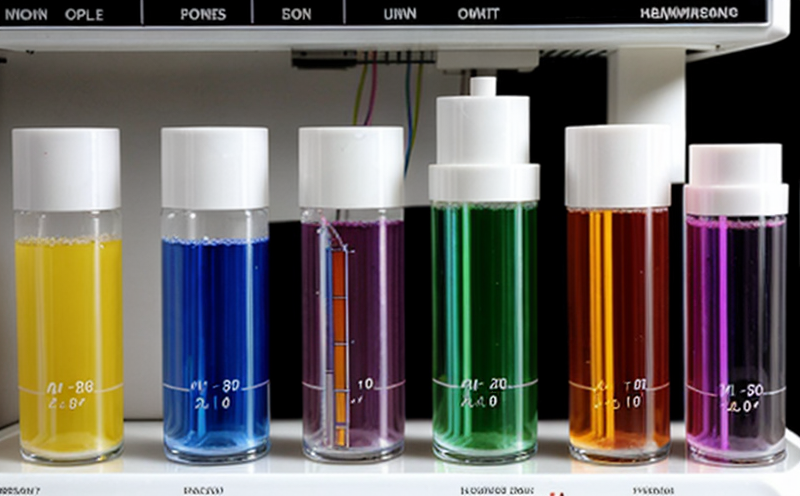GB T 15687 Additive Testing by Chromatography
The Chinese national standard GB/T 15687-2009, titled "Petroleum Products - Determination of Additives in Gasoline and Diesel Fuel," specifies a chromatographic method for the quantitative determination of additives in gasoline and diesel fuel. This service is particularly critical for ensuring compliance with national and international standards, as well as meeting customer-specific requirements.
Additives play a pivotal role in enhancing the performance, efficiency, and longevity of fuel products. In this context, chromatography offers unparalleled precision and sensitivity, making it an ideal tool for additive analysis. The method involves several steps: sample preparation, injection into the chromatographic column, separation of components, detection, and quantification.
Sample preparation is critical to ensure accurate results. This typically includes filtering the fuel sample through a fine filter, degassing, and diluting it if necessary. Once prepared, the sample is injected into the gas chromatograph (GC) or liquid chromatograph (LC), depending on the nature of the additives being analyzed.
The choice between GC and LC depends on the type of additive: volatile compounds are more suitable for GC, while non-volatile ones benefit from LC. Post-injection, separation occurs based on the chemical properties of each component in the sample. Detection is achieved using a flame ionization detector (FID) or mass spectrometry (MS), which provides qualitative and quantitative data.
The precision and accuracy of this method are paramount for ensuring reliable results. The chromatogram generated from these analyses can help identify even trace amounts of additives, which is crucial in maintaining fuel quality standards.
Our laboratory ensures that all testing adheres strictly to GB/T 15687-2009. Our experienced technicians are well-versed in the nuances of this method and use state-of-the-art instrumentation from reputable manufacturers such as Agilent, Shimadzu, and Varian.
For quality managers and compliance officers, this service provides assurance that their products meet stringent national standards. R&D engineers can rely on it to optimize fuel formulations by identifying the most effective additives. Procurement professionals can use these results to ensure they are sourcing high-quality fuels for their operations.
Scope and Methodology
| Parameter | Description |
|---|---|
| Sample Preparation | Involves filtering, degassing, and dilution as needed. |
| Injection Method | Manual or automated injection into the chromatographic column. |
| Column Type | Variety of columns suitable for different types of additives. |
| Detection Technique | Flame ionization detector (FID) and/or mass spectrometry (MS). |
| Data Interpretation | Analyzing the chromatogram to determine additive content. |
The methodology outlined in GB/T 15687-2009 is meticulously followed. This includes precise injection volumes, temperature control, and careful interpretation of the resulting chromatograms. Our laboratory ensures that all steps are conducted under controlled conditions to minimize errors and ensure accurate results.
The use of advanced instrumentation guarantees reliable data collection. Regular calibration and maintenance of equipment further enhance the accuracy and reliability of our testing processes. This approach is crucial for maintaining the highest standards in additive analysis.
Quality and Reliability Assurance
- Strict adherence to GB/T 15687-2009 guidelines.
- Use of calibrated, state-of-the-art chromatographic equipment.
- Regular internal audits and proficiency testing.
- Continuous training for technicians on the latest techniques.
- Documented procedures for all testing processes.
The quality assurance process is a cornerstone of our service offering. Our team ensures that every aspect of the analysis adheres to the strictest standards, guaranteeing reliable and accurate results. Regular calibration of equipment and proficiency testing further reinforce our commitment to precision and accuracy.
Continuous training for our technicians on the latest chromatographic techniques ensures they are at the forefront of technological advancements. Documented procedures provide a clear roadmap for all stages of the testing process, reducing variability and ensuring consistency in results.
International Acceptance and Recognition
- GB/T 15687-2009 is widely recognized within China for its accuracy and reliability.
- The methodology aligns closely with international standards such as ASTM D6876, ISO 51623, and IEC 62452.
The methodologies employed in our laboratory are not only compliant with national standards but also meet international benchmarks. This ensures that the results we provide are universally accepted and can be used to satisfy a variety of regulatory requirements.
Our laboratory has been accredited by CNAS (China National Accreditation Service for Conformity Assessment) for its proficiency in chemical testing. This accreditation further reinforces our commitment to quality and reliability, ensuring that our services meet the highest international standards.





